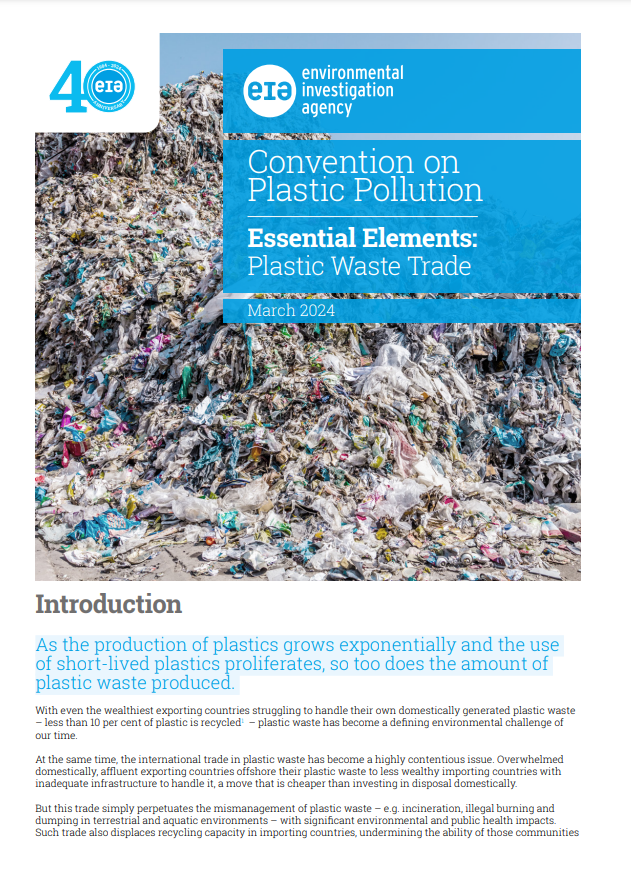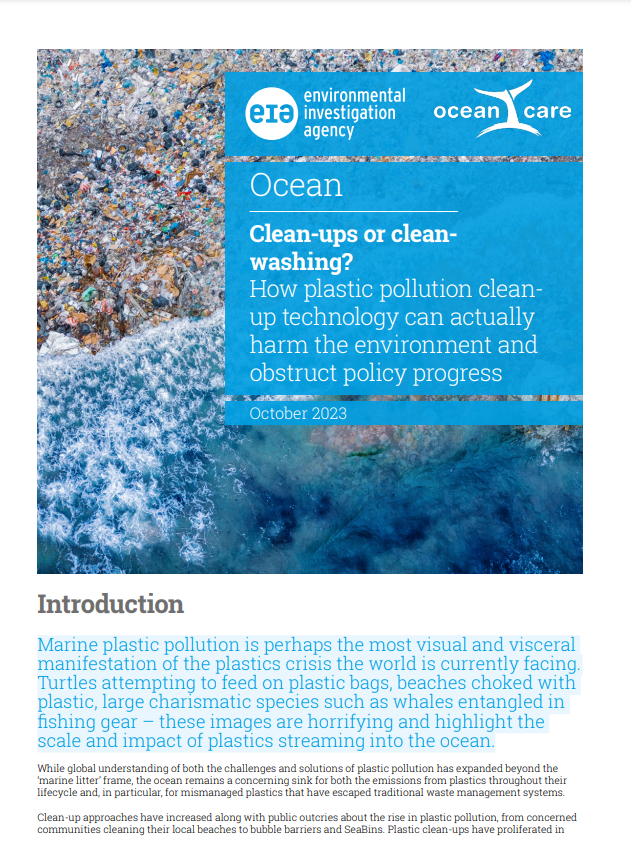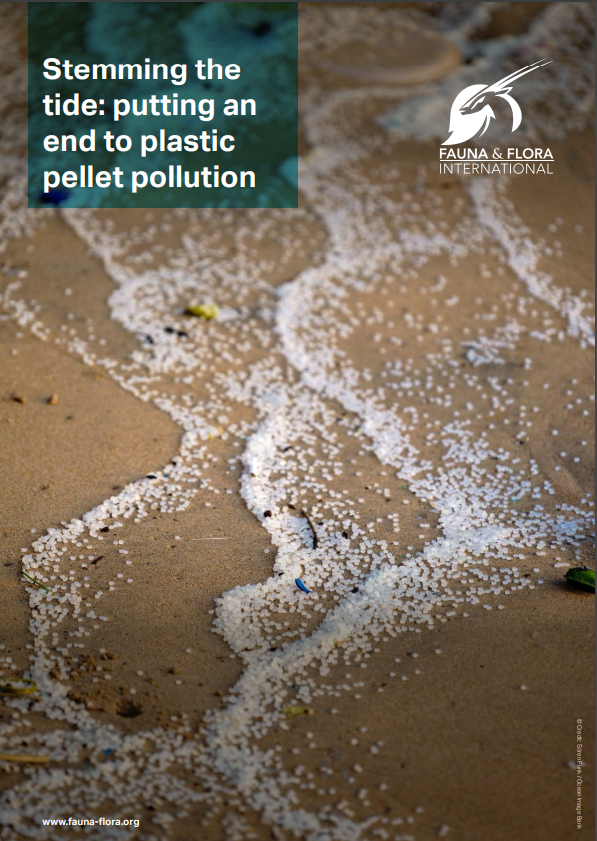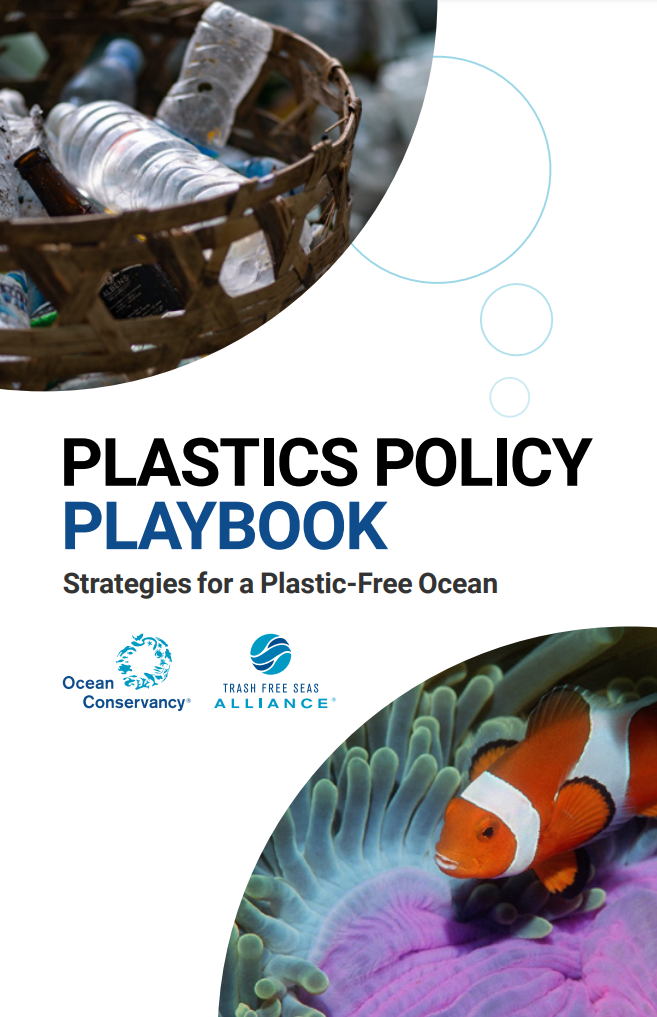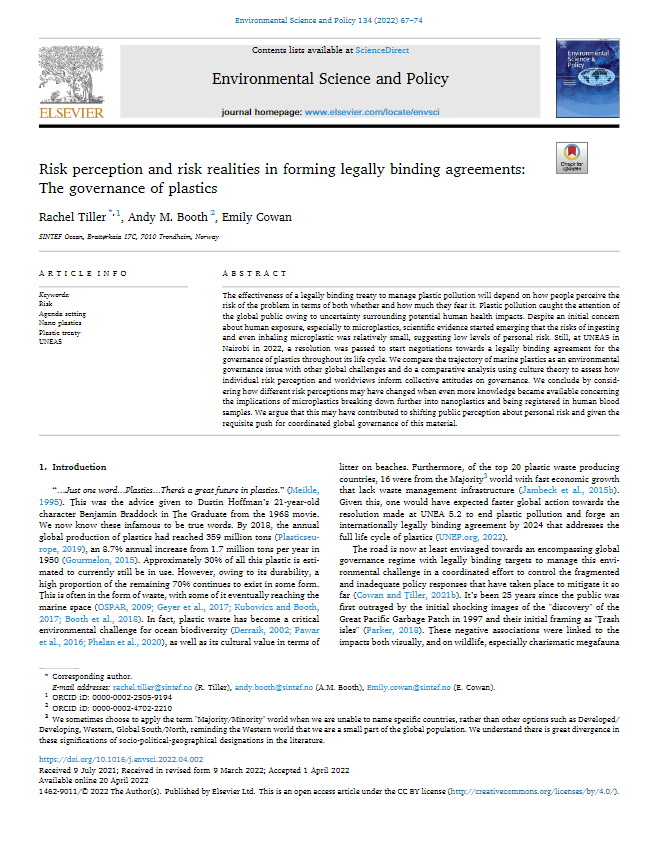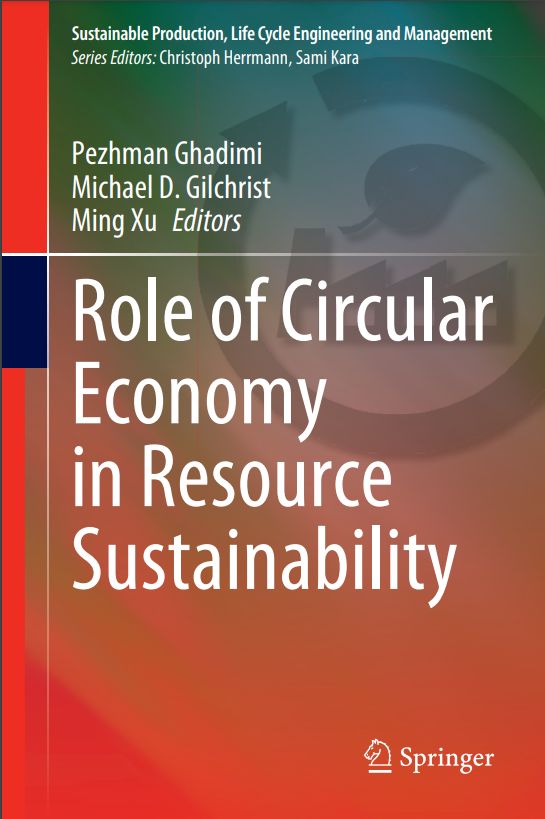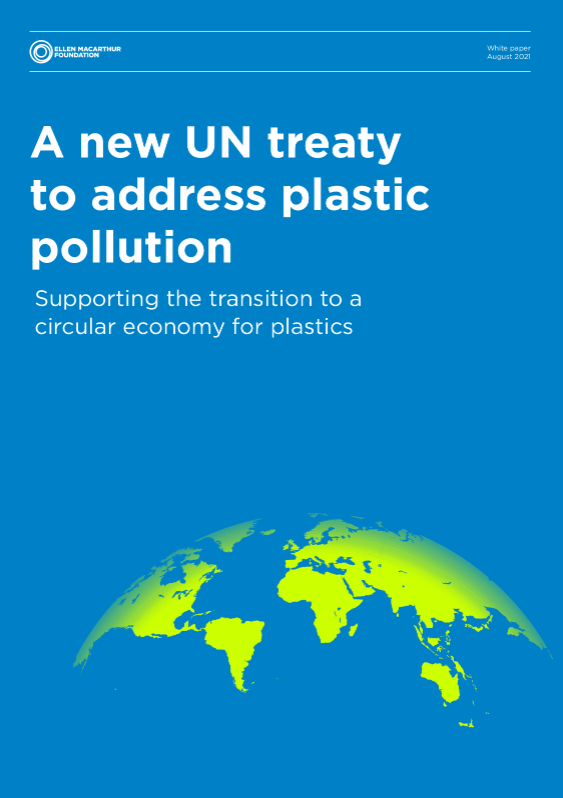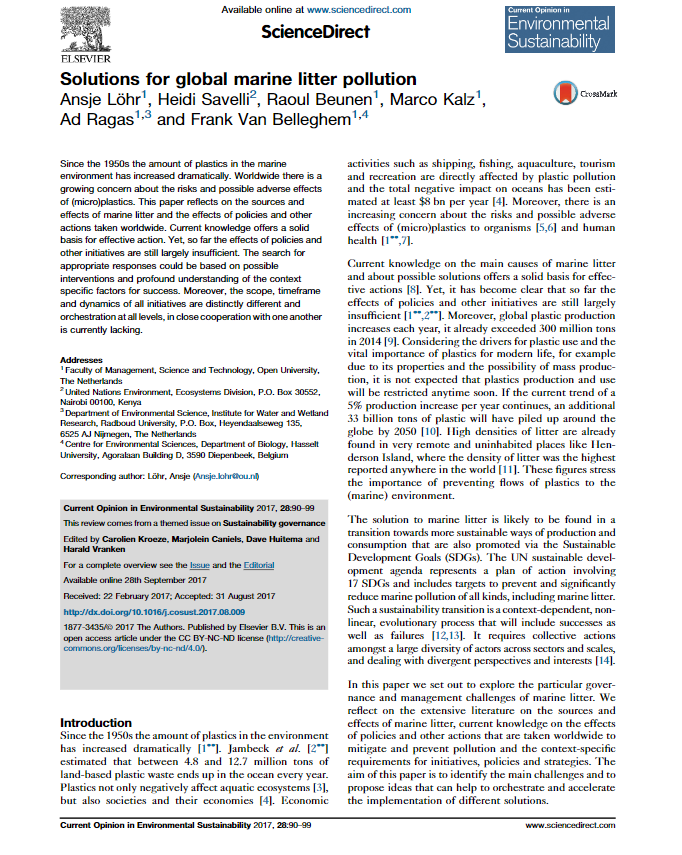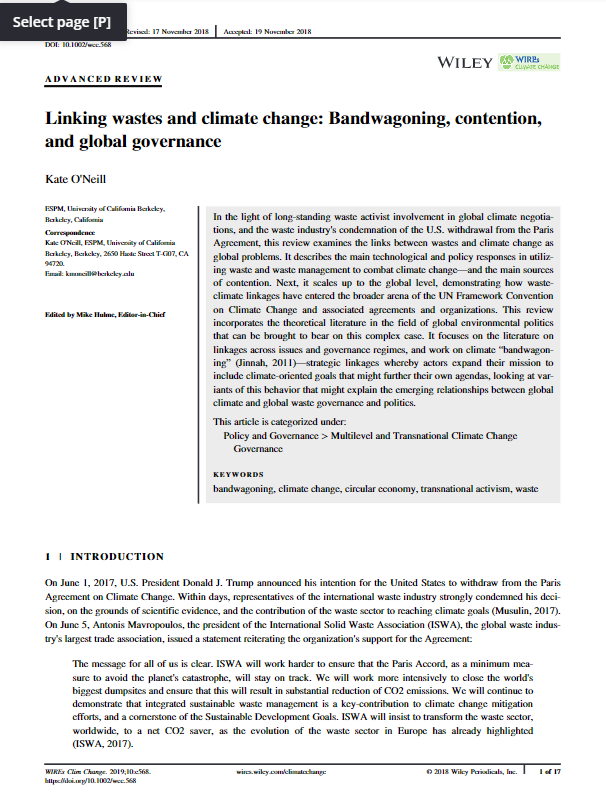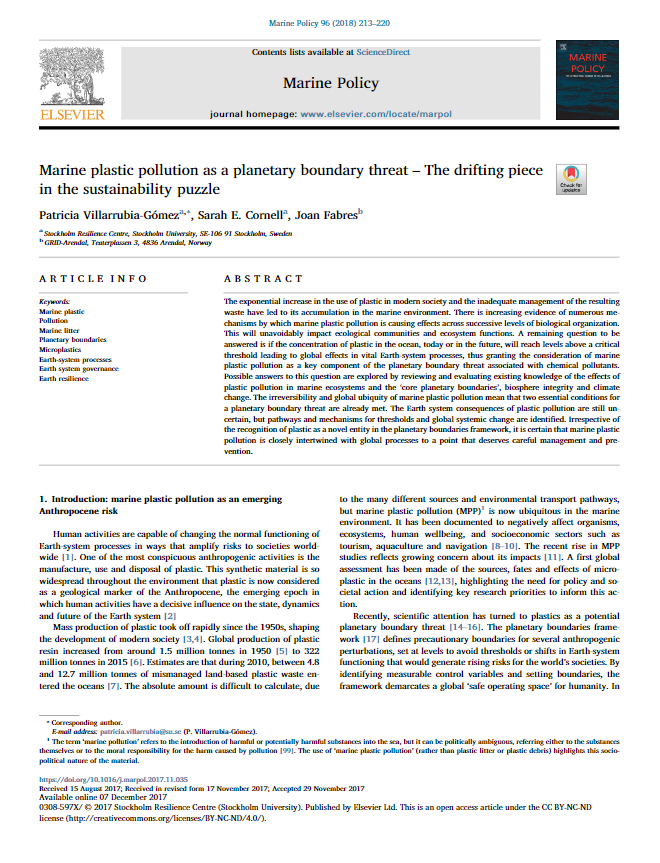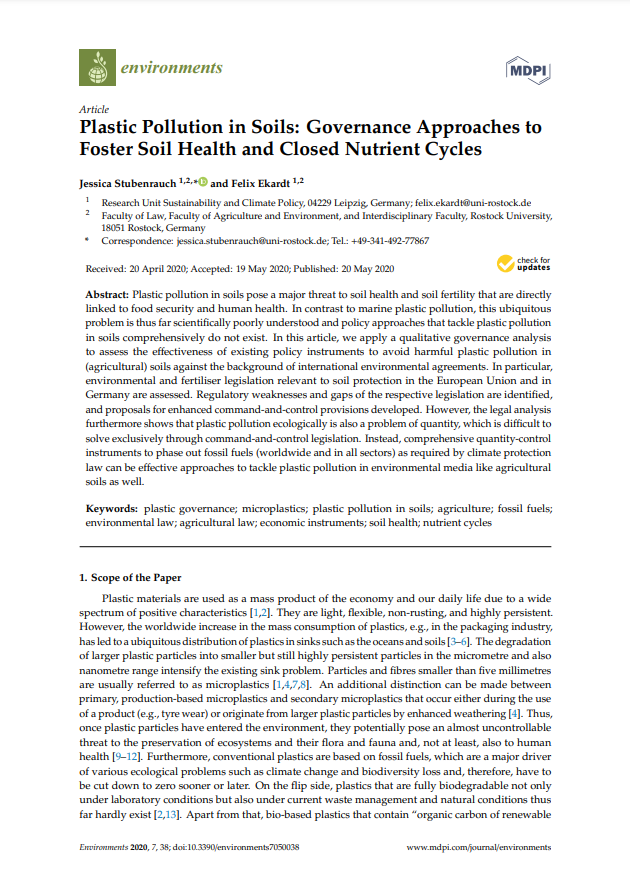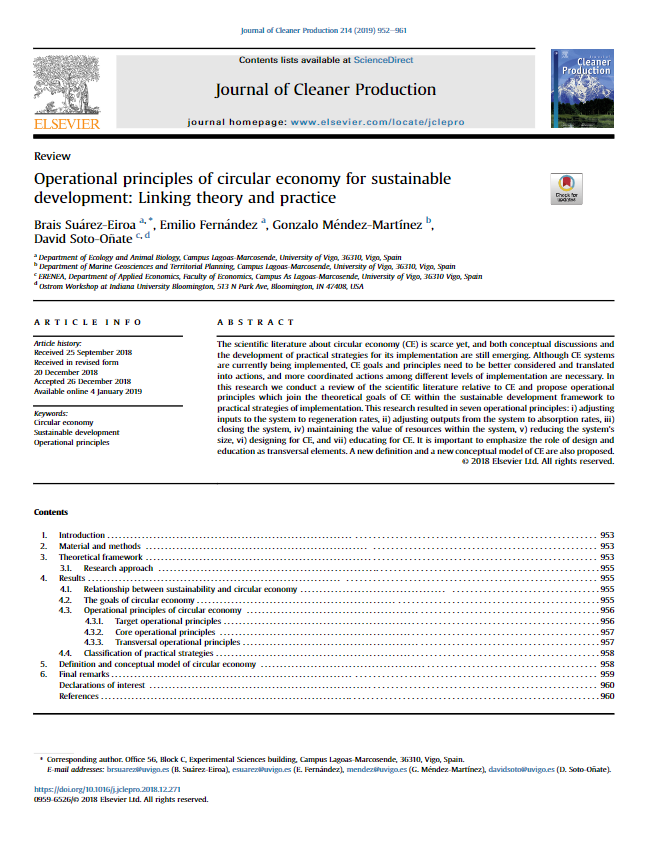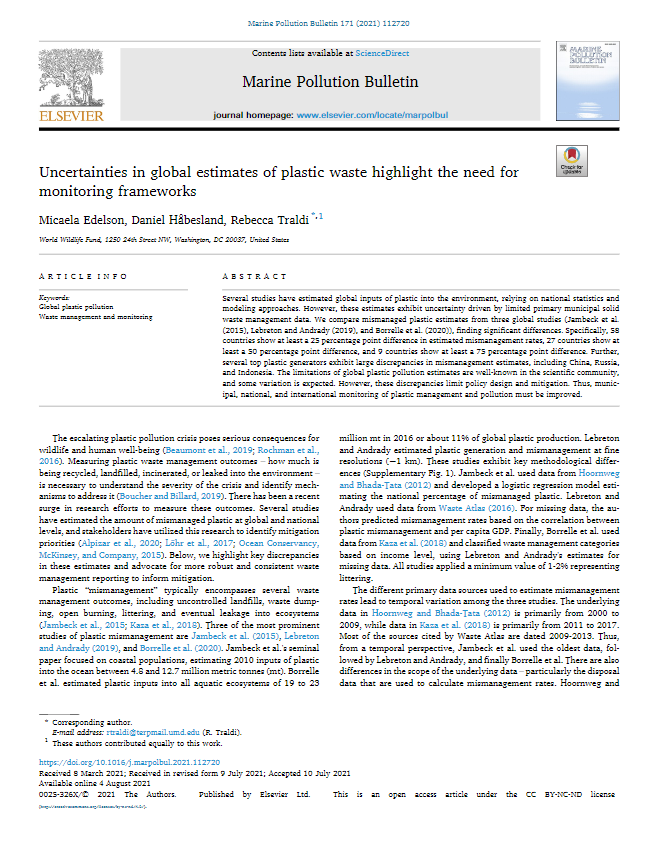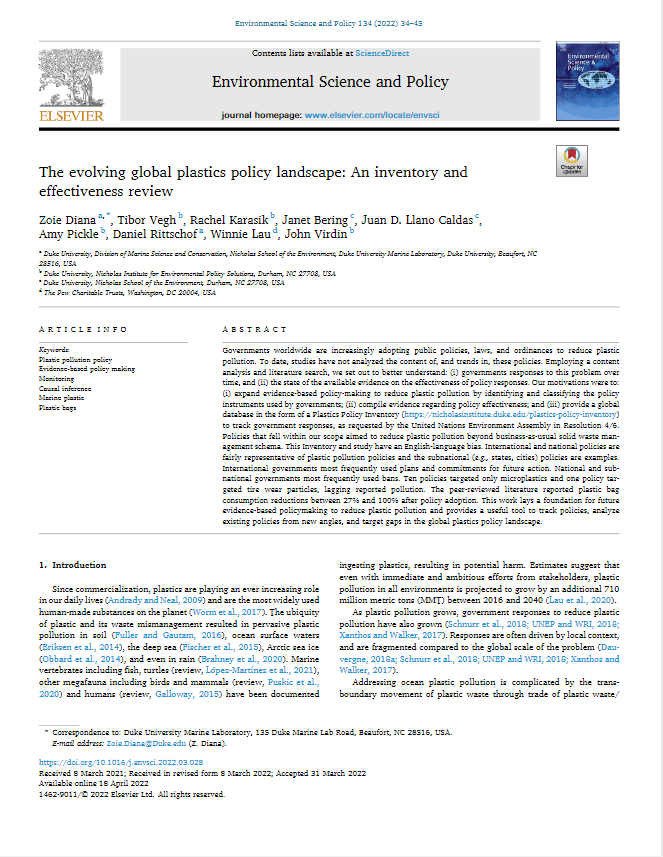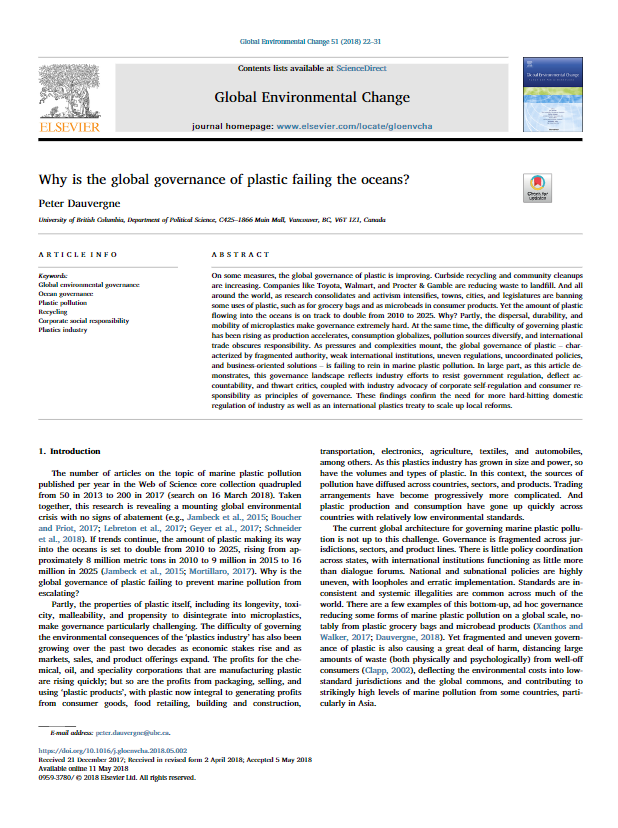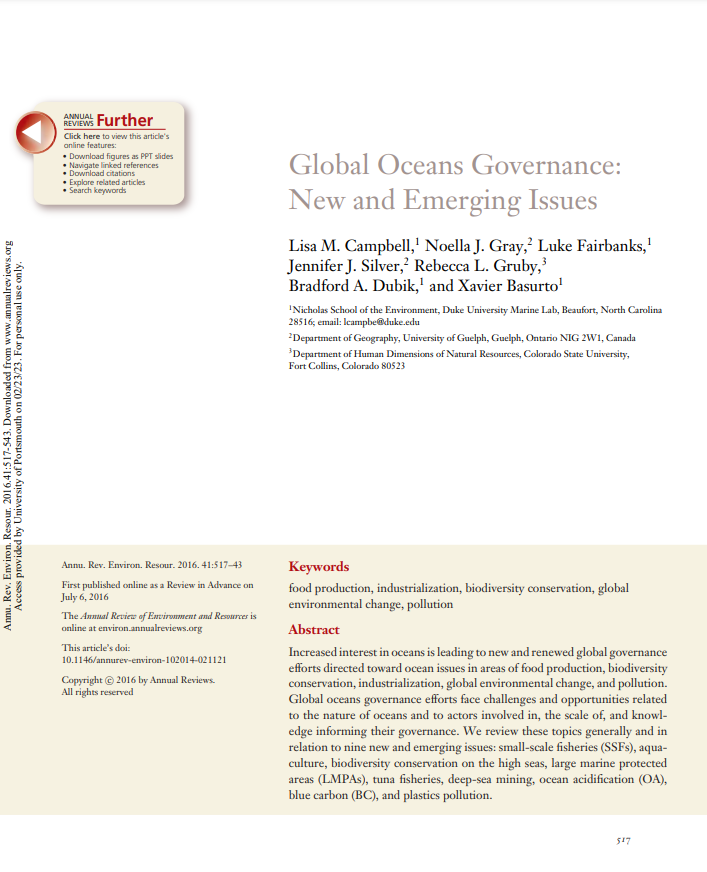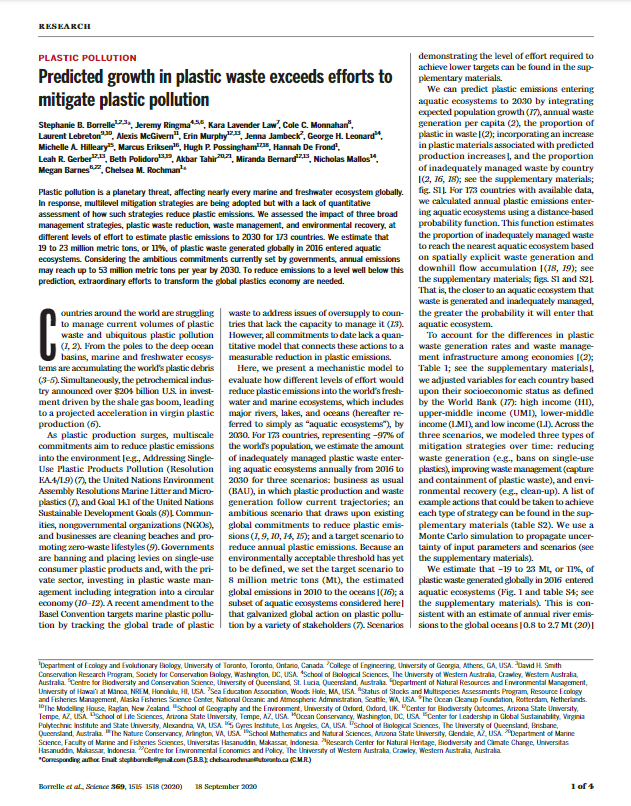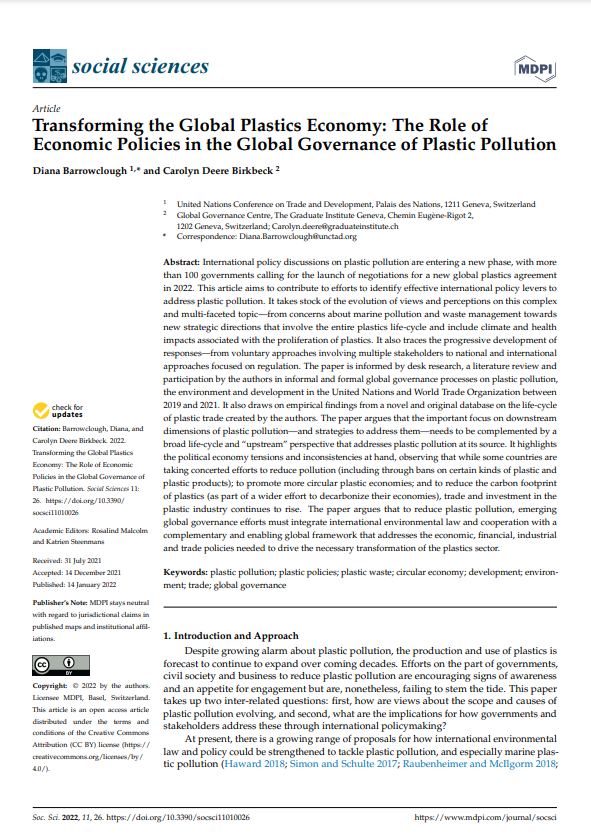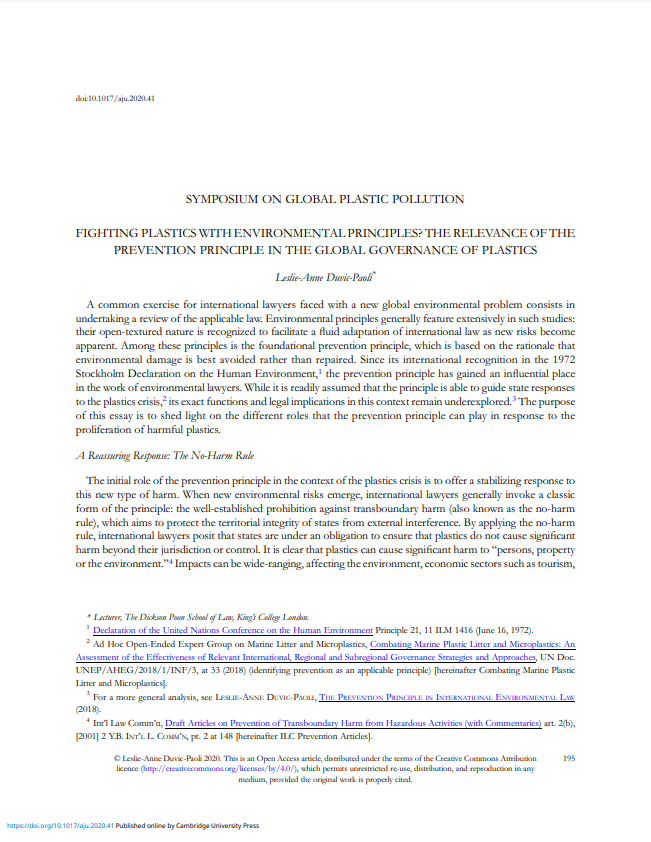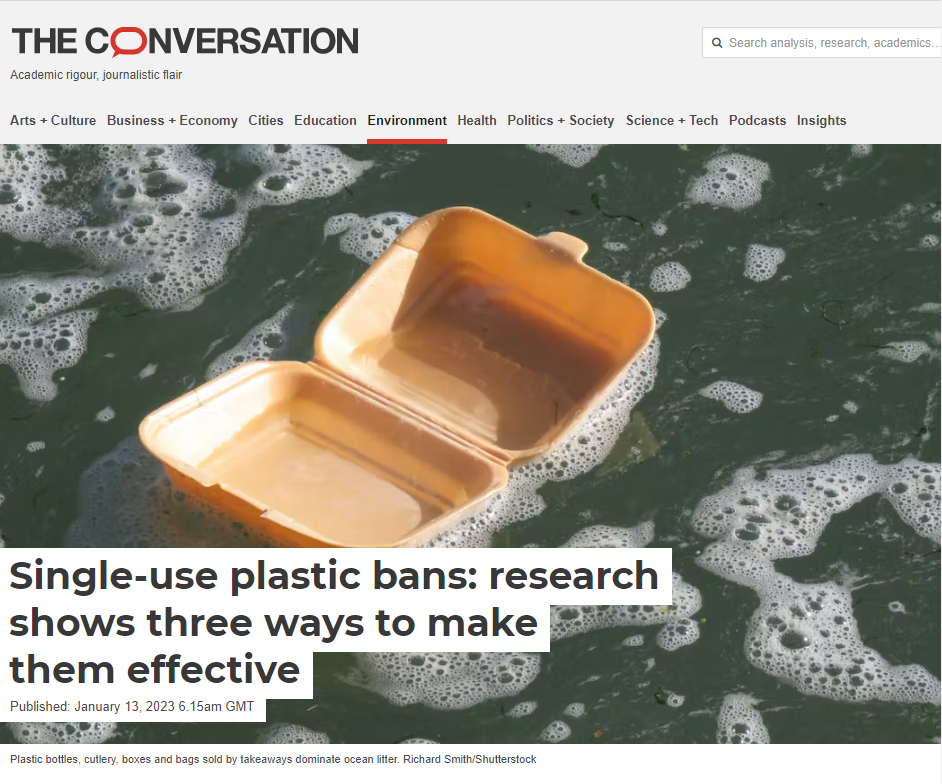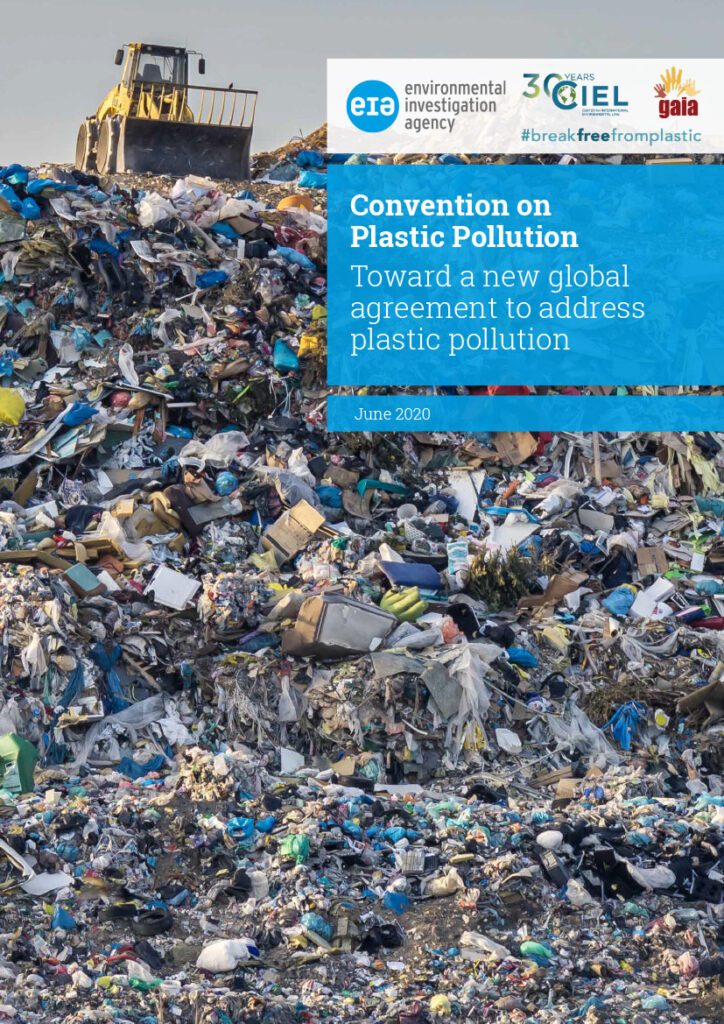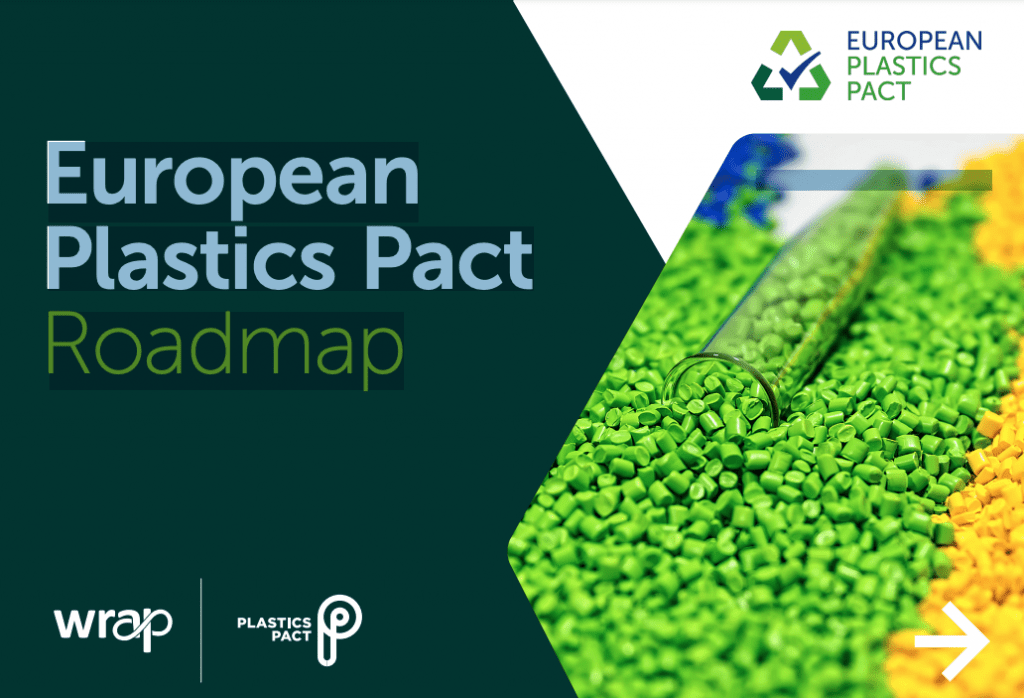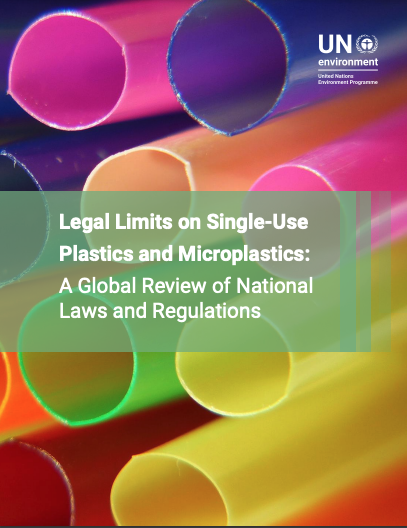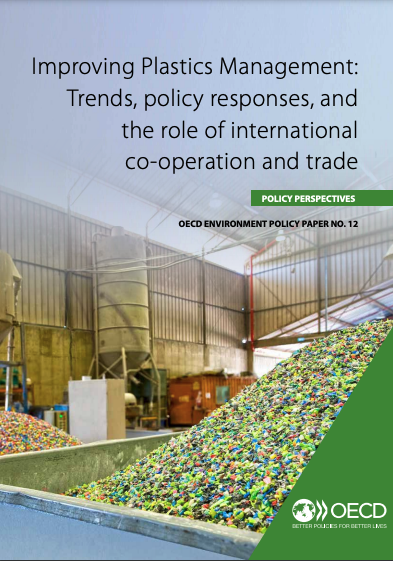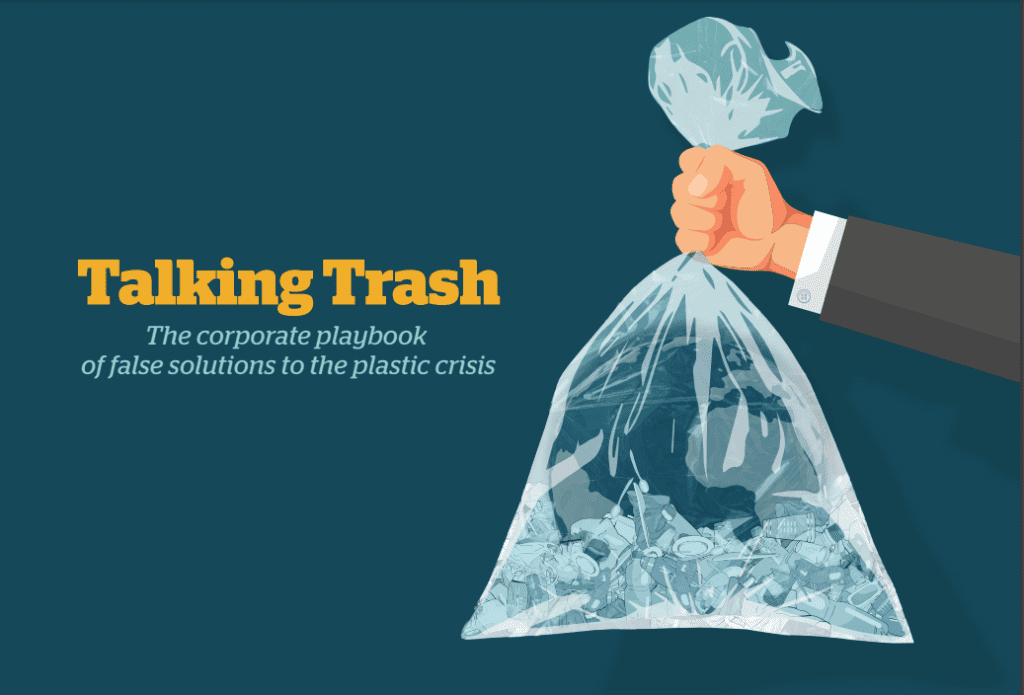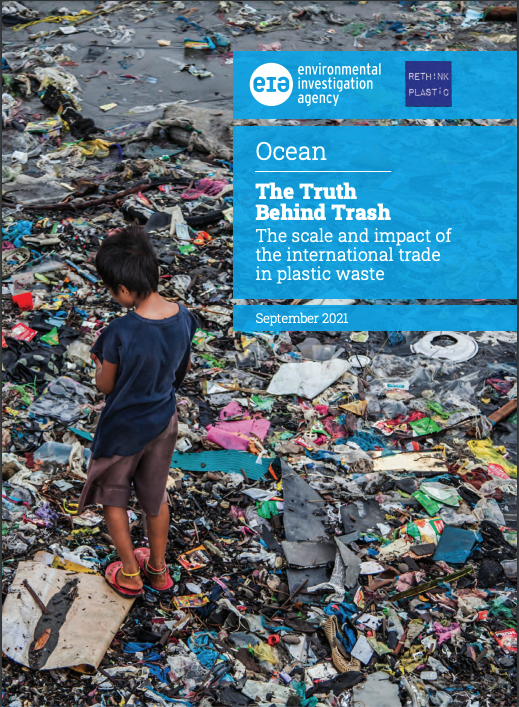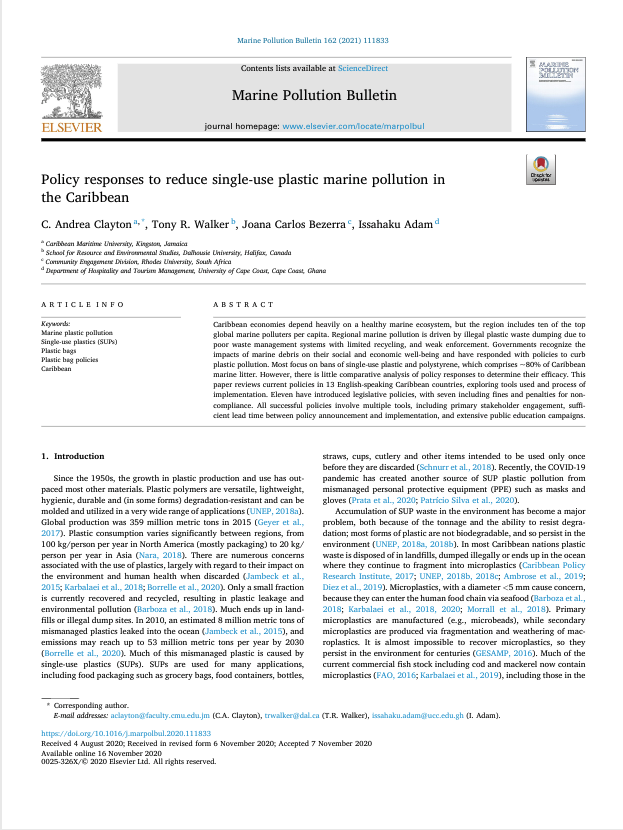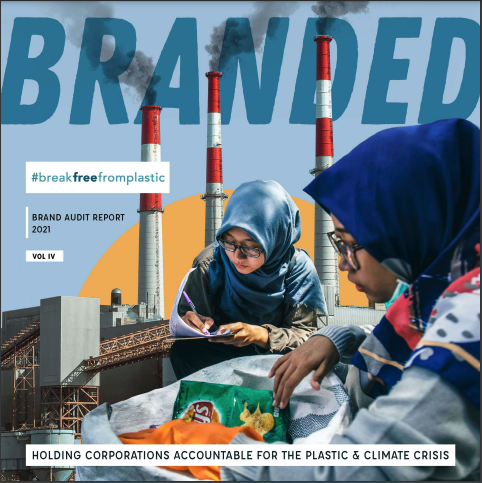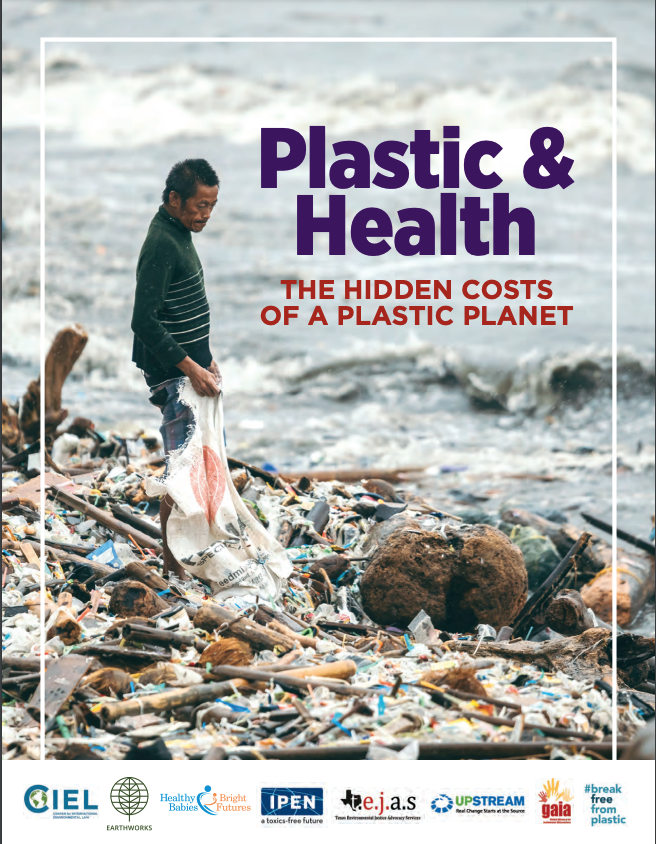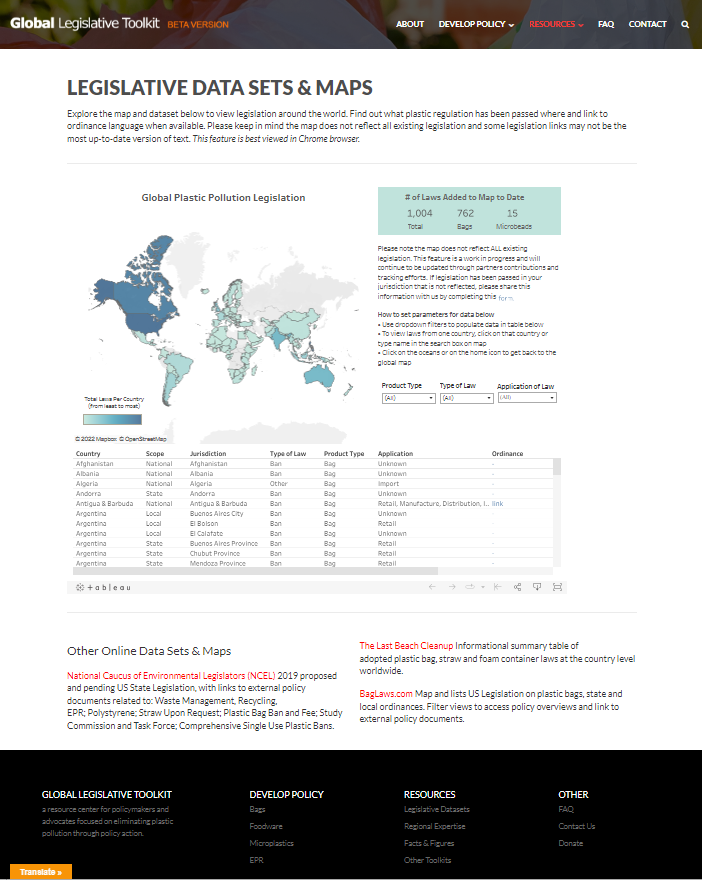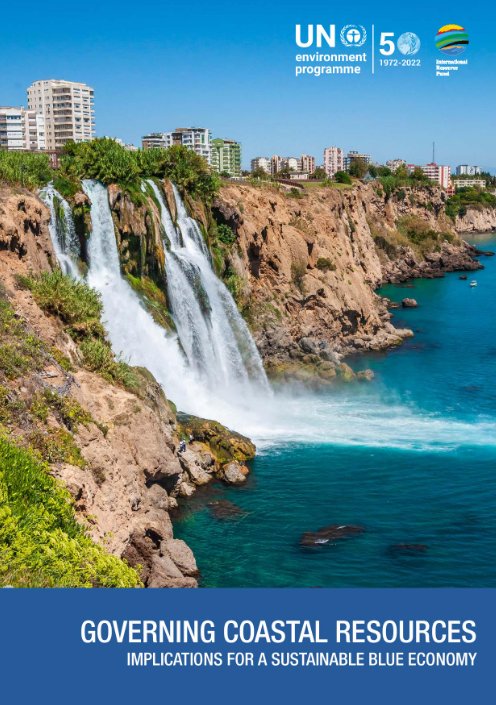Ocean Plastics Leadership Network & UK Government. (2024). United Kingdom National Treaty Dialogues on Plastic Pollution INC-4: Multi-stakeholder Convening Report 2024.
Climate Impact of Primary Plastic Production
Year: 2024
Karali, N., Khanna, N., & Shah, N. (2024). Climate Impact of Primary Plastic Production. Lawrence Berkeley National Laboratory. Report #: LBNL-2001585. Retrieved from https://escholarship.org/uc/item/12s624vf
Ambrose, K. K. (2023). Contextual Barriers Facing Caribbean SIDS in the Global Governance of Plastic Pollution: Assessing the Need for Harmonised Marine Debris Monitoring and Contextual Equity to Support Participation in the Global Plastics Treaty Negotiations by Caribbean SIDS. WMU World Maritime University.
Shomuyiwa, D. O., Onukansi, F. O., Ivanova, M., & Lucero‐Prisno III, D. E. (2023). The Plastic treaty: What is in it for Africa?. Public Health Challenges, 2(2), e83.
The necessity of justice for a fair, legitimate, and effective treaty on plastic pollution
Year: 2023
Dauvergne, P. (2023). The necessity of justice for a fair, legitimate, and effective treaty on plastic pollution. Marine Policy, 155, 105785.
Filella, M., & Turner, A. (2023). Towards the global plastic treaty: a clue to the complexity of plastics in practice. Environmental Sciences Europe, 35(1), 99.
Punka, A. K. (2023). Towards an effective global plastics treaty: A legal analysis of treaty design elements to promote participation and effectiveness. Master thesis, University of Oslo.
Landrigan, P., Symeonides, C., Raps, H., & Dunlop, S. (2023). The global plastics treaty: why is it needed?. The Lancet, 402(10419), 2274-2276.
Bertolazzi, S., Cuttitta, A., & Pipitone, V. (2024). Addressing marine plastic pollution: a systematic literature review. Current Opinion in Environmental Sustainability, 68, 101428.
Insights from international environmental legislation and protocols for the global plastic treaty
Year: 2024
Aanesen, M., Ahi, J. C., Abate, T. G., Khan, F. R., de Vries, F. P., Kite-Powell, H., & Beaumont, N. J. (2024). Insights from international environmental legislation and protocols for the global plastic treaty. Scientific Reports, 14(1), 2750.
Many miles to go before we sleep: the long road to creating a comprehensive global plastics treaty
Year: 2024
Nagtzaam, G. (2024). Many Miles to Go Before We Sleep: The Long Road to Creating a Comprehensive Global Plastics Treaty. Vill. Env't LJ, 35, 1.
Fernandez, M. O., & Trasande, L. (2024). The Global Plastics Treaty: An Endocrinologist's Assessment. Journal of the Endocrine Society, 8(1), bvad141.
Environmental Investigation Agency. (2022). Connecting the Dots: Plastic Pollution and the planetary emergency.
Environmental Investigation Agency. (2022). Convention on Plastic Pollution - Essential Elements: Financial Aspects.
Environmental Investigation Agency. (2022). Convention on Plastic Pollution - Essential Elements: Reporting and Monitoring.
Environmental Investigation Agency. (2022). Convention on Plastic Pollution - Essential Elements: Fishing Gear.
Environmental Investigation Agency & Deutsche Umwelthilfe. (2022). Convention on Plastic Pollution - Essential Elements: Reuse.
Convention on Plastic Pollution – Essential Elements: Virgin Plastic Production and Consumption
Year: 2022
Environmental Investigation Agency. (2022). Convention on Plastic Pollution - Essential Elements: Virgin Plastic Production and Consumption.
Environmental Investigation Agency & Rethink Plastic. (2023). Plastic Waste Power Play: The offshoring and recycling displacement involved in trying to recycle EU plastic waste.
Environmental Investigation Agency. (2023). Cultivating Plastic: Part 1 - Agriplastics and the UK grocery retail supply chain.
Environmental Investigation Agency. (2023). Cultivating Plastic: Part 2 - Environmental and human health harm caused by agriplastics.
Environmental Investigation Agency. (2023). Cultivating Plastic: Part 3 - Agriplastic waste mismanagement and criminality.
Environmental Investigation Agency. (2023). Cultivating Plastic: Part 4 - Caution with regards to the adoption of potential agriplastic alternatives.
Environmental Investigation Agency. (2023). Convention on Plastic Pollution - Essential Elements: Microplastics.
Environmental Investigation Agency. (2023). From Paper to Practice: Translating environmental principles into operational measures in the global plastics treaty.
Environmental Investigation Agency. (2023). Cultivating Plastic: Part 5 - Preventing plastic pollution in the fisheries and aquaculture supply chain.
Environmental Investigation Agency. (2023). Dedicated Programmes of Work - Plastic Pollution: Different sectors, different solutions.
Environmental Investigation Agency. (2024). Convention on Plastic Pollution - Essential Elements: Plastic Waste Trade.
Basel Action Network, Environmental Investigation Agency & Global Alliance for Incinerator Alternatives. (2023). Bridging the Basel Convention Gaps with the Future Plastics Treaty.
Environmental Investigation Agency & Ocean Care. (2023). Clean-ups or clean-washing? How plastic pollution clean-up technology can actually harm the environment and obstruct policy progress.
Environmental Investigation Agency. (2024). Global Plastics Treaty: Initial Considerations for INC-4.
Business Coalition for a Global Plastics Treaty. (2024). Key messages ahead of INC-4 in April 2024: Business Needs Global Rules.
Center for International Environmental Law. (2024). Plastic Polymers under the Full Life Cycle Approach: Key Considerations on the Scope of the Future Plastics Treaty.
IUCN & World Commission on Environmental Law. (2024). A global plastics treaty and biodiversity: converging or conflicting regimes? IUCN's proposal for a specific article on "Biodiversity Aspects" in the future Plastics Treaty. IUCN.
Center for International Environmental Law. (2024). Towards a Global Treaty to End Plastic Pollution: Ensuring Meaningful and Effective Stakeholder Involvement in the Intergovernmental Environmental Negotiations.
INC-4: Time to Speed Up Priorities – Brief
Year: 2024
WWF. (2024). INC-4: Time to Speed Up Priorities - Brief.
Greenpeace. (2024). People Vs Plastic! Global Support for a Strong Plastics Treaty.
Gore, A.C., La Merrill, M.A., Patisaul, H.B., & Sargis, R. (2024). Endocrine Disrupting Chemicals: Threats to Human Health. The Endocrine Society and IPEN.
IPEN. (2023). Troubling Toxics: Eliminating Harmful Plastic Chemicals Through the Plastics Treaty.
Climate Impacts of Plastics
Year: 2024
GRID-Arendal. (2024). Climate impacts of plastics: Global actions to stem climate change and end plastic pollution. Norway.
Dreyer, E., Hansen, T., Holmberg, K., Olsen, T., & Stripple, J. (2024). Towards a Global Plastics Treaty: Tracing the UN Negotiations. Lund University. Lund, Sweden.
Wagner, M., Monclús, L., Arp, H. P. H., Groh, K. J., Løseth, M. E., Muncke, J., Wang, Z., Wolf, R., & Zimmermann, L. (2024). State of the science on plastic chemicals - Identifying and addressing chemicals and polymers of concern. PlastChem.
UN Human Rights Office of the High Commissioner. (2024). Aligning States Duties and Business Responsibilities Related to Plastics with the Guiding Principles on Business and Human Rights | Information Note to the fourth session of the Intergovernmental Negotiating Committee to develop an international legally binding instrument on plastic pollution, including in the marine environment (INC-4). United Nations.
Gündoğdu, S. (2024). Plastic Waste Trade: A New Colonialist Means of Pollution Transfer. Springer Nature.
Scientists' Coalition for an Effective Plastics Treaty. (2024). Scientists’ Coalition’s response to the revised draft text of the international legally binding instrument on plastic pollution, including in the marine environment (UNEP/PP/INC.4/3).
Scientists' Coalition for an Effective Plastics Treaty. (2024). Policy Brief: Impacts of plastics across the food system. DOI: 10.5281/zenodo.10653557
Scientists' Coalition for an Effective Plastics Treaty. (2023). Fact Sheet: Plastic pollution at each life stage.
Maharashtra Plastic Action Partnership. (2024). Social Context Assessment of the Plastic Waste Sector | Maharashtra, India. Global Plastic Action Partnership.
Raubenheimer, K. & Urho, N. (2024). Global criteria to address problematic, unnecessary and avoidable plastic products. Nordic Council of Ministers.
Tangri, N. (2023). POLICY BRIEF: Common But Differentiated Responsibility in the Global Plastics Treaty. Scholars Strategy Network.
The Plastic Waste Management Framework
Year: 2023
Berger, R. (2023). The Plastic Waste Management Framework. Alliance to End Plastic Waste.
Plastic Health Council. (2023). The Health Scientists' Global Plastics Treaty.
GRID-Arendal. (2022). Crafting an effective treaty on plastic pollution: Emerging fault lines in the intergovernmental negotiations.
WWF. (2023). Who Pays For Plastic Pollution?. WWF International.
Scientists' Coalition for an Effective Plastics Treaty. (2023). Fact Sheet: Plastic pollution at each life stage.
Global Plastic Policy Tool
Year: 2023
University of California Santa Barbara & the Benioff Ocean Science Laboratory DSE. (2023). Global Plastic Policy Tool. https://global-plastics-tool.org/
Schäffer, A., Groh, K. J., Sigmund, G., Azoulay, D., Backhaus, T., Bertram, M. G., ... & Scheringer, M. (2023). Conflicts of Interest in the Assessment of Chemicals, Waste, and Pollution. Environmental Science & Technology.
Scientists' Coalition for an Effective Plastics Treaty. (2023). Fact Sheets: A Global Plastic Treaty Guided by Indigenous Pacific Wisdom. ISBN: 978-982-04-1280-4
Fact Sheet: Bioplastics, biobased plastics and plastics with biodegradable properties 101
Year: 2023
Scientists' Coalition for an Effective Plastics Treaty. (2023). Fact Sheet: Bioplastics, biobased plastics and plastics with biodegradable properties 101. ISBN: 978-982-04-1290-3
Fact Sheet: Plastic Removal Technologies 101
Year: 2023
Scientists' Coalition for an Effective Plastics Treaty. (2023). Fact Sheet: Plastic Removal Technologies 101. ISBN: 978-982-04-1281-1
Fact Sheet: Plastics 101
Year: 2023
Scientists' Coalition for an Effective Plastics Treaty. (2023). Fact Sheet: Plastics 101. ISBN: 978-982-04-1282-8
Scientists' Coalition for an Effective Plastics Treaty. (2023). Fact Sheet: Plastics Alternatives and Substitutes 101. ISBN: 978-982-04-1283-5
A Little Less Conversation: How existing governance can strengthen the future global plastics treaty
Year: 2023
Maes, T., Wienrich, N., Weiand, L., & Cowan, E. (2023). A Little Less Conversation: How existing governance can strengthen the future global plastics treaty. Cambridge Prisms: Plastics, 1-22.
The Plastics Management Index measures, compares and contrasts the efforts made by a selection of 25 countries at different stages of development in their management of plastics, covering the entire lifecycle of plastic products. Its goal is to assess each country’s capacity to minimise plastics mismanagement or leakages across the plastics lifecycle, while promoting the optimal production and use of plastic as a resource. In so doing, it views the issue through the lens of policy, regulation and business practice, while also incorporating consumer actions and perspectives.
Economist Impact & Back to Blue. (2023). Global Plastics Summit: Working towards a robust UN plastics treaty, October 11th-12th 2023 | Bangkok - Outcomes and key recommendations.
SourceMaterial. (2023, November 13). ‘Get Out of Jail Free’: How plastics offsetting is giving industry a licence to pollute. https://www.source-material.org/plastic-offsetting-philippines-pcx-verra-cement/
Towards Eliminating Plastic Pollution by 2040 | A Policy Scenario Analysis: Interim Findings
Year: 2023
OECD. (2023). Towards Eliminating Plastic Pollution by 2040 | A Policy Scenario Analysis: Interim Findings.
Plastics treaty text must center ecosystems
Year: 2023
Tessnow-von Wysocki, I., Wang, M., Morales-Caselles, C., Woodall, L. C., Syberg, K., Carney Almroth, B., ... & Helm, R. R. (2023). Plastics treaty text must center ecosystems. Science, 382(6670), 525-526.
Environmental Investigation Agency. (2023). Untangled: The plastics treaty's critical role in tackling fishing gear | Policy briefing for the Intergovernmental Negotiation Committee for UNEA 5/14.
GRID-Arendal. (2023). Science-policy interface for plastic pollution. Eds. Raubenheimer, K. & Urho, N. GRID-Arendal, Arendal.
NOT OPEN ACCESS: Tommasi, F., & Mancini, L. (2023). What Kind of International Legally Binding Instrument on Plastic Pollution Do We Need?. In International Conference on Microplastic Pollution in the Mediterranean Sea (pp. 23-28). Cham: Springer International Publishing.
Towards Ending Plastic Pollution by 2040 – 15 Global Policy Interventions for Systems Change
Year: 2023
Nordic Council of Ministers & SYSTEMIQ. (2023). Towards Ending Plastic Pollution by 2040 - 15 Global Policy Interventions for Systems Change. Nordic Council of Ministers.
March, A., Bowyer, C. & Roberts, K. (2023, October 2). New single-use plastic ban takes effect in England – here’s why its impact may be limited. The Conversation.
Scientists’ Coalition for an Effective Plastics Treaty (2023) Policy Brief: Climate change impacts of plastics. DOI: 10.5281/zenodo.7972056. Available in English, French, and Spanish.
Scientists’ Coalition for an Effective Plastics Treaty (2023) Policy Brief: Transitioning to a safe and sustainable circular economy for plastics. DOI: 10.5281/zenodo.7974916. Available in English, French, and Spanish.
Scientists’ Coalition for an Effective Plastics Treaty (2023) Policy Brief: Role of chemicals and polymers of concern in the global plastics treaty, DOI: 10.5281/zenodo.7941525. Available in English, French, and Spanish.
Scientists’ Coalition for an Effective Plastics Treaty (2023) Policy Brief: The global plastics treaty: What is the role of bio-based plastic, biodegradable plastic and bioplastic? (possible core obligation 8). DOI: 10.5281/zenodo.10021063. Available in English, French, Spanish, and German.
Scientists’ Coalition for an Effective Plastics Treaty (2023) Towards a Just Transition Away from Plastic Pollution. DOI: 10.5281/zenodo.10021005. Available in English, French, and Spanish.
Scientists’ Coalition for an Effective Plastics Treaty. (2023). Waste Management. DOI: 10.5281/zenodo.10020855. Available in English, French, and Spanish.
Launched on September 20th, 2017, Fueling Plastics, an ongoing investigative series, examining the deep linkages between the fossil fuels and plastics industries and the products they produce.
The guide allows the user to compare current policies and expected legal developments in a number of jurisdictions across the globe. First published in 2021, latest update in 2023.
Extensive database of existing plastic legislation around the world. Topics include: design & reuse, extended producer responsibility, maritime sources, microplastics, production & manufacturing, reduction, transparency & traceability, waste management, and waste trade.
This webpage hosts several documentaries and films on plastics and their impacts on different environments and humans' relationships with nature. The content on this page is available through request for screenings in communities, festivals, work places, schools, or events.
García-Hermosa, M. I., & Woodall, L. C. (2023). Marine plastic: The solution is bigger than removal. Frontiers in Sustainability, 4, 1023480.
Hardesty, B. D., Willis, K., & Vince, J. (2022). An imperative to focus the plastic pollution problem on place-based solutions. Frontiers in Sustainability, 3, 963432.
Ramos, B. D., Lima, T. M. D., & Costa, M. F. D. (2022). Where are Brazil's marine litter scientific data?. Frontiers in Sustainability, 3, 947343.
Ballerini, T., Chaudon, N., Fournier, M., Coulomb, J. P., Dumontet, B., Matuszak, E., & Poncet, J. (2022). Plastic pollution on Durance riverbank: First quantification and possible environmental measures to reduce it. Frontiers in Sustainability, 3, 866982.
Deeney, M., Green, R., Yan, X., Dooley, C., Yates, J., Rolker, H. B., & Kadiyala, S. (2023). Human health effects of recycling and reusing food sector consumer plastics: A systematic review and meta-analysis of life cycle assessments. Journal of Cleaner Production, 397(136567), 136567.
Bradley, C. G., & Corsini, L. (2023). A literature review and analytical framework of the sustainability of reusable packaging. Sustainable Production and Consumption, 37, 126–141.
A comprehensive review on the production of alternative fuel through medical plastic waste
Year: 2023
Kumar, A., Pali, H. S., & Kumar, M. (2023). A comprehensive review on the production of alternative fuel through medical plastic waste. Sustainable Energy Technologies and Assessments, 55(102924), 102924.
It Takes Two to Tango: How Ability and Morality Shape Consumers’ Willingness to Refill and Reuse
Year: 2023
Shah, P., & Yang, J. Z. (2023). It takes two to tango: How ability and morality shape consumers’ willingness to refill and reuse. Environmental Management.
Chapter 15 – Safety assessment of refillable and recycled plastics packaging for food use
Year: 2023
NOT OPEN ACCESS: Bayer, F. L., & Jetten, J. (2023). Safety assessment of refillable and recycled plastics packaging for food use. In Present Knowledge in Food Safety (pp. 240–259). Elsevier.
Upcycling to Sustainably Reuse Plastics
Year: 2022
Zhao, X., Boruah, B., Chin, K. F., Đokić, M., Modak, J. M., & Soo, H. S. (2022). Upcycling to Sustainably Reuse Plastics. Advanced Materials, 34(25), e2100843.
O'Rourke, K., Wurzer, C., Murray, J., Doyle, A., Doyle, K., Griffin, C., Christensen, B., Brádaigh, C. M. Ó., & Ray, D. (2022). Diverted from Landfill: Reuse of Single-Use Plastic Packaging Waste. Polymers, 14(24), 5485.
NOT OPEN ACCESS: Espada, A., Farinha, I., & Duarte, C. A. M. (2022). Preventing single-use of plastic packaging. Design strategies for circular business models: Refill, reuse and recycle. In Springer Series in Design and Innovation (pp. 459–472). Springer International Publishing.
A Roadmap to 2025: The UK Plastics Pact
Year: 2022
WRAP. (2022). A Roadmap to 2025 - The UK Plastics Pact Roadmap.
The UK Plastics Pact Annual Report 2021-22
Year: 2022
WRAP. (2022). The UK Plastics Pact Annual Report 2021-22.
Moss, E., Gerken, K., Youngblood, K., & Jambeck, J. R. (2022). Global landscape analysis of reuse and refill solutions. Frontiers in Sustainability, 3, 149.
Gómez, I. D. L., & Escobar, A. S. (2022). The dilemma of plastic bags and their substitutes: A review on LCA studies. Sustainable Production and Consumption, 30, 107–116.
Jia, C., Das, P., Kim, I., Yoon, Y.-J., Tay, C. Y., & Lee, J.-M. (2022). Applications, treatments, and reuse of plastics from electrical and electronic equipment. Journal of Industrial and Engineering Chemistry, 110, 84–99.
Uvarajan, T., Gani, P., Chuan, N. C., & Zulkernain, N. H. (2022). Reusing plastic waste in the production of bricks and paving blocks: a review. European Journal of Environmental and Civil Engineering, 26(14), 6941–6974.
Behaviour change interventions to increase citizen participation in reuse and refill systems
Year: 2022
WRAP. (2022). Behaviour change interventions to increase citizen participation in reuse and refill systems.
Plastics Tracker Report 2021
Year: 2021
WRAP. (2021). Plastics Tracking Survey 2021: Behaviours, attitudes and awareness around plastic waste.
Realising Reuse: The potential for scaling up reusable packaging, and policy recommendations
Year: 2021
Rethink Plastic Alliance. (2021). Realising Reuse: The potential for scaling up reusable packaging, and policy recommendations.
Coelho, P. M., Corona, B., ten Klooster, R., & Worrell, E. (2020). Sustainability of reusable packaging–Current situation and trends. Resources, Conservation & Recycling: X, 6(100037), 100037. https://doi.org/10.1016/j.rcrx.2020.100037
Ainscough, J. (2019). Plastic Packaging Plan: achieving zero ‘waste’ exports. Policy Connect
Willis, K., Hardesty, B. D., Vince, J., & Wilcox, C. (2019). The success of water refill stations reducing single-use plastic bottle litter. Sustainability, 11(19), 5232.
Reuse – rethinking packaging
Year: 2019
Ellen MacArthur Foundation. (2019). Reuse – rethinking packaging.
New treaty must address ghost fishing gear
Year: 2022
Vitorino, H., Ferrazi, R., Correia-Silva, G., Tinti, F., Belizário, A. C., Amaral, F. A., ... & Azevedo-Santos, V. M. (2022). New treaty must address ghost fishing gear. Science, 376(6598), 1169-1169.
A disaster risk reduction framework for the new global instrument to end plastic pollution
Year: 2023
Senathirajah, K., Bonner, M., Schuyler, Q., & Palanisami, T. (2023). A disaster risk reduction framework for the new global instrument to end plastic pollution. Journal of Hazardous Materials, 449, 131020.
Silva Filho, C. R., & Velis, C. A. (2022). United Nations’ plastic pollution treaty pathway puts waste and resources management sector at the centre of massive change. Waste Management & Research, 40(5), 487-489.
Carratta, G., & Jaeckel, L. (2023). Global plastics governance: opportunities and challenges for its improvement from a life cycle perspective. European Journal of Legal Studies, 15(1), 29-66.
Akrofi, D. F., Shang, P., & Ciesielczuk, J. (2023). Reconsidering: Approaches towards Facilitating Non-State Actors' Participation in the Global Plastics Regime. Eur. J. Legal Stud., 14(2), 121-140.
Ambrose, K. K., & Walker, T. R. (2023). Identifying opportunities for harmonized microplastics and mesoplastics monitoring for Caribbean Small Island Developing States using a spatiotemporal assessment of beaches in South Eleuthera, The Bahamas. Marine Pollution Bulletin, 193, 115140.
Tang, K. H. D. (2023). Enhanced plastic economy: a perspective and a call for international action. Environmental Science: Advances, 2(8), 1011-1018.
Shomuyiwa, D. O., Onukansi, F. O., Ivanova, M., & Lucero‐Prisno III, D. E. (2023). The Plastic treaty: What is in it for Africa?. Public Health Challenges, 2(2), e83.
Human Rights and the Global Plastics Treaty to Protect Health, Ocean Ecosystems and Our Climate
Year: 2023
NOT OPEN ACCESS: O’Meara, N. (2023). Human Rights and the Global Plastics Treaty to Protect Health, Ocean Ecosystems and Our Climate. The International Journal of Marine and Coastal Law, 38(3), 480-515.
Tilsted, J. P., Bauer, F., Birkbeck, C. D., Skovgaard, J., & Rootzén, J. (2023). Ending fossil-based growth: Confronting the political economy of petrochemical plastics. One Earth, 6(6), 607-619.
The impacts of plastics’ life cycle
Year: 2023
NOT OPEN ACCESS: Jambeck, J. R., & Walker-Franklin, I. (2023). The impacts of plastics’ life cycle. One Earth, 6(6), 600-606.
Oturai, N. G., Syberg, K., Fraisl, D., Hooge, A., Ramos, T. M., Schade, S., & Hansen, S. F. (2023). UN plastic treaty must mind the people: Citizen science can assist citizen involvement in plastic policymaking. One Earth, 6(6), 715-724.
Charting success for the Plastics Treaty
Year: 2023
NOT OPEN ACCESS: Brandon, A., Vanapalli, K. R., Martin, O. V., Dijkstra, H., De la Torre, G. E., Hartmann, N. B., ... & Pacini, H. (2023). Charting success for the Plastics Treaty. One Earth, 6(6), 575-581.
Landrigan, P. J., Raps, H., Cropper, M., Bald, C., Brunner, M., Canonizado, E. M., ... & Dunlop, S. (2023). The Minderoo-Monaco commission on plastics and human health. Annals of global health, 89(1).
Walker, T. R., & Fequet, L. (2023). Current trends of unsustainable plastic production and micro (nano) plastic pollution. TrAC Trends in Analytical Chemistry, 116984.
Deeney, M., Yates, J., Green, R., & Kadiyala, S. (2022). Centring human health in the global plastics treaty: a call to action. BMJ Global Health, 7(11), e011040.
Trasande, L. (2022). A global plastics treaty to protect endocrine health. The Lancet Diabetes & Endocrinology, 10(9), 616-618.
Dey, T., Trasande, L., Altman, R., Wang, Z., Krieger, A., Bergmann, M., ... & Almroth, B. C. (2022). Global plastic treaty should address chemicals. Science, 378(6622), 841-842.
Wang, Z., & Praetorius, A. (2022). Integrating a chemicals perspective into the global plastic treaty. Environmental Science & Technology Letters, 9(12), 1000-1006.
A global plastic treaty must cap production
Year: 2022
Bergmann, M., Almroth, B. C., Brander, S. M., Dey, T., Green, D. S., Gundogdu, S., ... & Walker, T. R. (2022). A global plastic treaty must cap production. Science, 376(6592), 469-470.
Scientists’ Coalition for an Effective Plastics Treaty (2023) Policy Brief: Role of chemicals and polymers of concern in the global plastics treaty.
Fauna & Flora International (FFI). (2022). Stemming the tide: putting an end to plastic pellet pollution.
Faber, J., Raphaël, S. and van den Berg, R. (2023). Preventing spills of plastic pellets: a feasibility analysis of regulatory options. CE Delft, Delft.
A Just Transition to Reusable Packaging: Necessary Conditions, Benefits and Best Practice
Year: 2022
Unpackaged. (2022). A Just Transition to Reusable Packaging: Necessary Conditions, Benefits and Best Practice.
Lau, W. W., Shiran, Y., Bailey, R. M., Cook, E., Stuchtey, M. R., Koskella, J., ... & Palardy, J. E. (2020). Evaluating scenarios toward zero plastic pollution. Science, 369(6510), 1455-1461.
Ocean Conservancy. (2019). Plastics Policy Playbook: Strategies for a Plastic-Free Ocean.
Homrich, A. S., Galvão, G., Abadia, L. G., & Carvalho, M. M. (2018). The circular economy umbrella: Trends and gaps on integrating pathways. Journal of Cleaner Production, 175, 525-543.
Risk perception and risk realities in forming legally binding agreements: The governance of plastics
Year: 2022
Tiller, R., Booth, A. M., & Cowan, E. (2022). Risk perception and risk realities in forming legally binding agreements: The governance of plastics. Environmental Science & Policy, 134, 67-74.
Usman, S., Abdull Razis, A. F., Shaari, K., Azmai, M. N. A., Saad, M. Z., Mat Isa, N., & Nazarudin, M. F. (2022). The Burden of Microplastics Pollution and Contending Policies and Regulations. International Journal of Environmental Research and Public Health, 19(11), 6773.
Schultz, F. C., & Everding, S. (2022). The governance of circular plastics supply chain collaboration. Role of Circular Economy in Resource Sustainability, 155-160.
Schuyler, Q., Hardesty, B. D., Lawson, T. J., Opie, K., & Wilcox, C. (2018). Economic incentives reduce plastic inputs to the ocean. Marine Policy, 96, 250-255.
Simon, N., Raubenheimer, K., Urho, N., Unger, S., Azoulay, D., Farrelly, T., ... & Weiand, L. (2021). A binding global agreement to address the life cycle of plastics. Science, 373(6550), 43-47.
Palm, E., Hasselbalch, J., Holmberg, K., & Nielsen, T. D. (2022). Narrating plastics governance: policy narratives in the European plastics strategy. Environmental Politics, 31(3), 365-385.
Raubenheimer, K., & McIlgorm, A. (2018). Can the Basel and Stockholm Conventions provide a global framework to reduce the impact of marine plastic litter?. Marine Policy, 96, 285-290.
Raubenheimer, K., McIlgorm, A., & Oral, N. (2018). Towards an improved international framework to govern the life cycle of plastics. Review of European, Comparative & International Environmental Law, 27(3), 210-221.
Raubenheimer, K., & Urho, N. (2020). Rethinking global governance of plastics–The role of industry. Marine Policy, 113, 103802.
Reike, D., Vermeulen, W. J., & Witjes, S. (2018). The circular economy: new or refurbished as CE 3.0?—exploring controversies in the conceptualization of the circular economy through a focus on history and resource value retention options. Resources, conservation and recycling, 135, 246-264.
OECD (2022), Global Plastics Outlook: Policy Scenarios to 2060, OECD Publishing, Paris, https://doi.org/10.1787/aa1edf33-en.
Ellen MacArthur Foundation. (2021). A new UN treaty to address plastic pollution: supporting the transition to a circular economy of plastics.
World Wide Fund for Nature. (2021). Success Criteria for a New Treaty on Plastic Pollution. Gland, Switzerland.
World Wide Fund for Nature (WWF). (2021). Plastics: The Costs to Society, the Environment and the Economy. Gland, Switzerland.
Mæland, C. E., & Staupe‐Delgado, R. (2020). Can the global problem of marine litter be considered a crisis?. Risk, Hazards & Crisis in Public Policy, 11(1), 87-104.
Solutions for global marine litter pollution
Year: 2017
Löhr, A., Savelli, H., Beunen, R., Kalz, M., Ragas, A., & Van Belleghem, F. (2017). Solutions for global marine litter pollution. Current opinion in environmental sustainability, 28, 90-99.
Nielsen, T. D., Hasselbalch, J., Holmberg, K., & Stripple, J. (2020). Politics and the plastic crisis: A review throughout the plastic life cycle. Wiley Interdisciplinary Reviews: Energy and Environment, 9(1), e360.
O'Neill, K. (2019). Linking wastes and climate change: Bandwagoning, contention, and global governance. Wiley Interdisciplinary Reviews: Climate Change, 10(2), e568.
Villarrubia-Gómez, P., Cornell, S. E., & Fabres, J. (2018). Marine plastic pollution as a planetary boundary threat–The drifting piece in the sustainability puzzle. Marine policy, 96, 213-220.
Plastic pollution challenges in marine and coastal environments: from local to global governance
Year: 2018
Haward, M. (2018). Plastic pollution of the world’s seas and oceans as a contemporary challenge in ocean governance. Nature communications, 9(1), 667.
Vince, J., & Hardesty, B. D. (2018). Governance solutions to the tragedy of the commons that marine plastics have become. Frontiers in Marine Science, 5, 214.
Plastic Pollution in Soils: Governance Approaches to Foster Soil Health and Closed Nutrient Cycles
Year: 2020
Stubenrauch, J., & Ekardt, F. (2020). Plastic pollution in soils: governance approaches to foster soil health and closed nutrient cycles. Environments, 7(5), 38.
Operational principles of circular economy for sustainable development: Linking theory and practice
Year: 2019
Suárez-Eiroa, B., Fernández, E., Méndez-Martínez, G., & Soto-Oñate, D. (2019). Operational principles of circular economy for sustainable development: Linking theory and practice. Journal of cleaner production, 214, 952-961.
Mendenhall, E. (2018). Oceans of plastic: a research agenda to propel policy development. Marine Policy, 96, 291-298.
Uncertainties in global estimates of plastic waste highlight the need for monitoring frameworks
Year: 2021
Edelson, M., Håbesland, D., & Traldi, R. (2021). Uncertainties in global estimates of plastic waste highlight the need for monitoring frameworks. Marine Pollution Bulletin, 171, 112720.
Diana, Z., Vegh, T., Karasik, R., Bering, J., Caldas, J. D. L., Pickle, A., ... & Virdin, J. (2022). The evolving global plastics policy landscape: An inventory and effectiveness review. Environmental Science & Policy, 134, 34-45.
Ferraro, G., & Failler, P. (2020). Governing plastic pollution in the oceans: Institutional challenges and areas for action. Environmental Science & Policy, 112, 453-460.
Nazareth, M. C., Marques, M. R., Pinheiro, L. M., & Castro, Í. B. (2022). Key issues for bio-based, biodegradable and compostable plastics governance. Journal of Environmental Management, 322, 116074.
Dauvergne, P. (2018). Why is the global governance of plastic failing the oceans?. Global Environmental Change, 51, 22-31.
Galaiduk, R., Lebreton, L., Techera, E., & Reisser, J. (2020). Transnational plastics: an Australian case for global action. Frontiers in Environmental Science, 8, 115.
Cowan, E., & Tiller, R. (2021). What shall we do with a sea of plastics? A systematic literature review on how to pave the road toward a global comprehensive plastic governance agreement. Frontiers in Marine Science, 8, 798534.
Campbell, L. M., Gray, N. J., Fairbanks, L., Silver, J. J., Gruby, R. L., Dubik, B. A., & Basurto, X. (2016). Global oceans governance: New and emerging issues. Annual review of environment and resources, 41, 517-543.
Alpizar, F., Carlsson, F., Lanza, G., Carney, B., Daniels, R. C., Jaime, M., ... & Wahdera, S. (2020). A framework for selecting and designing policies to reduce marine plastic pollution in developing countries. Environmental Science & Policy, 109, 25-35.
Tessnow-von Wysocki, I., & Le Billon, P. (2019). Plastics at sea: Treaty design for a global solution to marine plastic pollution. Environmental Science & Policy, 100, 94-104.
Borrelle, S. B., Ringma, J., Law, K. L., Monnahan, C. C., Lebreton, L., McGivern, A., ... & Rochman, C. M. (2020). Predicted growth in plastic waste exceeds efforts to mitigate plastic pollution. Science, 369(6510), 1515-1518.
Barrowclough, D., & Birkbeck, C. D. (2022). Transforming the global plastics economy: the role of economic policies in the global governance of plastic pollution. Social Sciences, 11(1), 26.
Cabernard, L., Pfister, S., Oberschelp, C., & Hellweg, S. (2022). Growing environmental footprint of plastics driven by coal combustion. Nature Sustainability, 5(2), 139-148.
Duvic-Paoli, L. (2020). Fighting Plastics with Environmental Principles? The Relevance of the Prevention Principle in the Global Governance of Plastics. AJIL Unbound, 114, 195-199.
Borrelle, S. B., Rochman, C. M., Liboiron, M., Bond, A. L., Lusher, A., Bradshaw, H., & Provencher, J. F. (2017). Why we need an international agreement on marine plastic pollution. Proceedings of the National Academy of Sciences, 114(38), 9994-9997.
International Institute for Sustainable Development. (2023). State of Global Environmental Governance 2022.
Read our article in The Conversation about the UK single-use plastic ban.
Convention on Plastic Pollution – Toward a new global agreement to address plastic pollution
Year: 2020
EIA. (2020). Convention on Plastic Pollution – Toward a new global agreement to address plastic pollution.
European Plastics Pact Roadmap
Year: 2020
WRAP. (2020) European Plastics Pact Roadmap.
UNEP. (2018). Legal Limits on Single-Use Plastics and Microplastics: A Global Review of National Laws and Regulations. UNEP.
OECD. (2018). Improving Plastics Management: Trends, policy responses, and the role of international co-operation and trade.
Provides information and guidance on various elements of plastics policy and highlights the important role of marine debris networks to prevent and reduce ocean plastic pollution.
Ford, H. V., Jones, N. H., Davies, A. J., Godley, B. J., Jambeck, J. R., Napper, I. E., ... & Koldewey, H. J. (2022). The fundamental links between climate change and marine plastic pollution. Science of the Total Environment, 806, 150392
Changing Markets Foundation. (2020). Talking Trash: The Corporate Playbook of False Solutions to the Plastic Crisis.
EIA. (2021). The Truth Behind Trash: The Scale and Impact of the International Trade in Plastic Waste.
Clayton, C., Walker, T., Bezerra, J., & Adam, I. (2021). Policy responses to reduce single-use plastic marine pollution in the Caribbean. Marine Pollution Bulletin, 162, 111833.
Branded: Brand audit report. Holding Corporations Accountable for the Plastic & Climate Crisis
Year: 2021
Break Free From Plastic. (2021) Global Brand Audit. Vol IV. Branded: Holding Corporations Accountable for the Plastic & Climate Crisis.
Azoulay, D., Villa, P., Arellano, Y., Gordon, M. F., Moon, D., Miller, K. A., & Thompson, K. (2019). Plastic & health: the hidden costs of a plastic planet. Geneva: CIEL.
The Minderoo Plastic Waste Makers Index tracks global plastics back to producers, investors and identifies sources of single use plastics, as well as top polluters and investors into plastic production.
The Legislative Map and Datasets are a good source of finding further plastic policies and searches can be filtered.
Roberts, K.P., Phang, S.C., Williams, J.B., Hutchinson, D.J., Kolstoe, S.E., de Bie, J., Williams, I.D. and Stringfellow, A.M., 2022. Increased personal protective equipment litter as a result of COVID-19 measures. Nature Sustainability, 5(3), pp.272-279.
Governing Coastal Resources
Year: 2021
International Resource Panel (2021). Governing Coastal Resources: Implications for a Sustainable Blue Economy. Fletcher, S., Lu, Y., Alvarez, P., McOwen, C., Baninla, Y., Fet, A.M., He, G., Hellevik, C., Klimmek, H., Martin, J., Mendoza Alfaro, R., Philis, G., Rabalais, N., Rodriguez Estrada, U., Wastell, J., Winton, S., Yuan, J. A. Report of the International Resource Panel. United Nations Environment Programme. Nairobi, Kenya.
Karasik, R., T. Vegh, Z. Diana, J. Bering, J. Caldas, A. Pickle, D. Rittschof, and J. Virdin. 2020. 20 Years of Government Responses to the Global Plastic Pollution Problem: The Plastics Policy Inventory. NI X 20-05. Durham, NC: Duke University
The Plastics Pollution Policy Inventory is an updateable and searchable database consisting of public policy documents targeting plastic pollution in several languages.
Pew Charitable Trusts and SYSTEMIQ. 2020. Breaking the Plastic Wave. A Comprehensive Assessment of Pathways Towards Stopping Ocean Plastic Pollution.
IRP. 2021. Policy options to eliminate additional marine plastic litter by 2050 under the G20 Osaka Blue Ocean Vision. Fletcher, S., Roberts, K.P., Shiran, Y., Virdin, J., Brown, C., Buzzi, E., Alcolea, I.C., Henderson, L., Laubinger, F., Milà i Canals, L., Salam, S., Schmuck, S.A., Veiga, J.M., Winton, S., Youngblood, K.M. Report of the International Resource Panel. United Nations Environment Programme. Nairobi, Kenya.



























